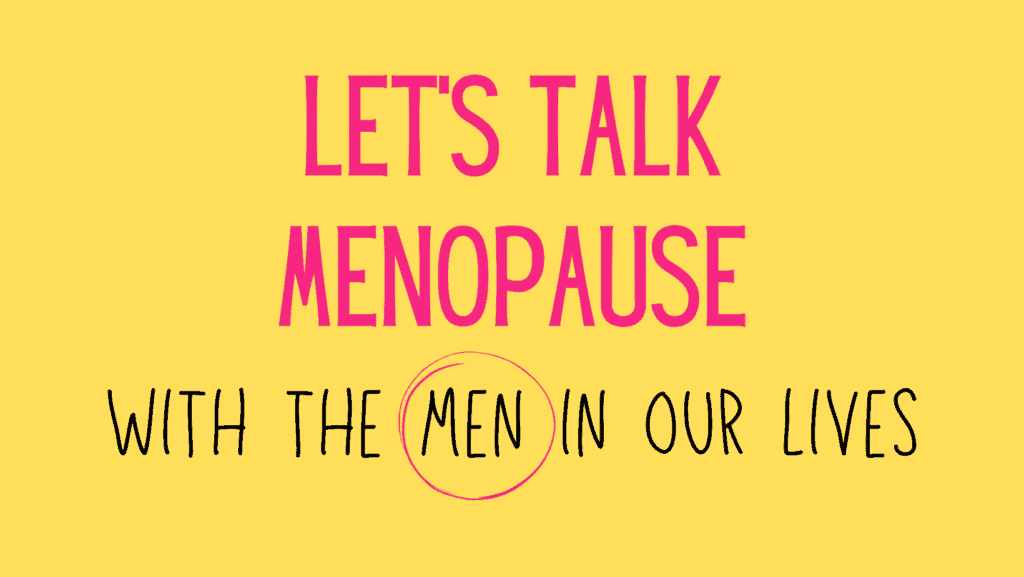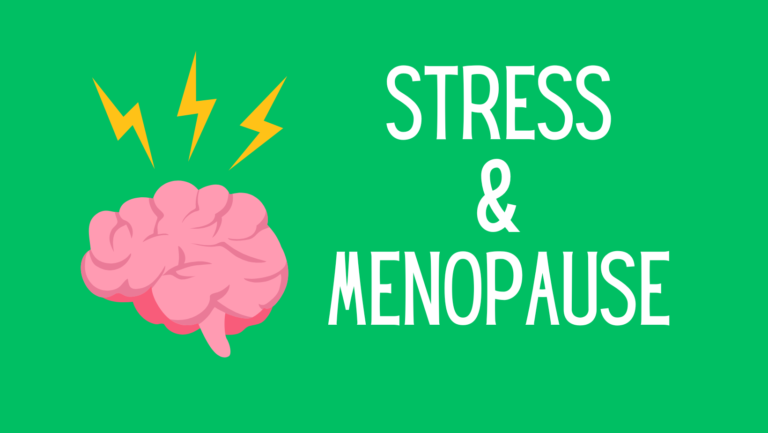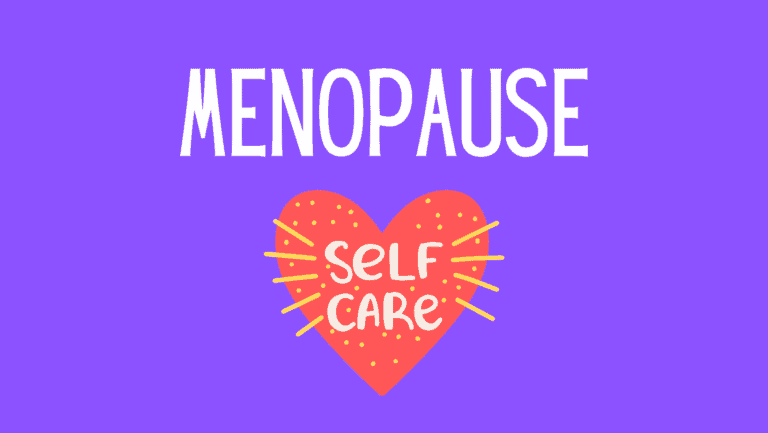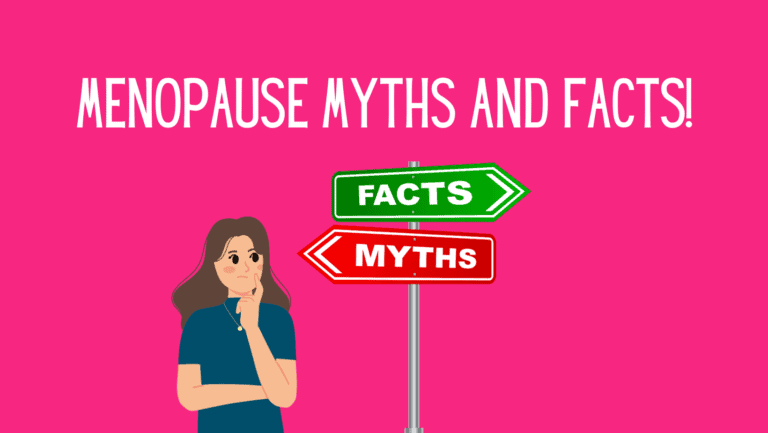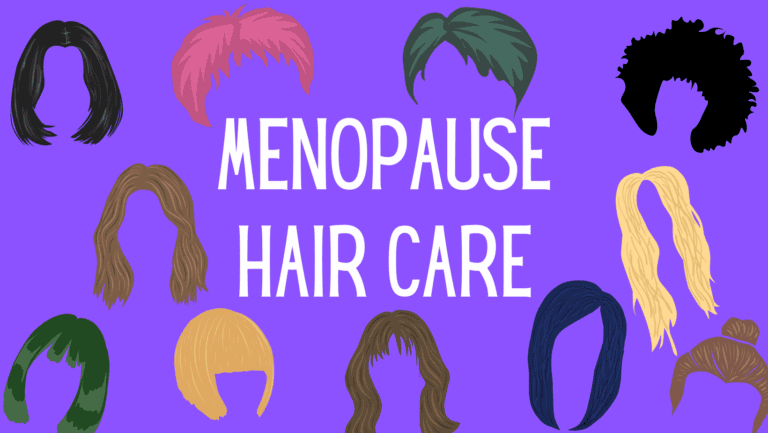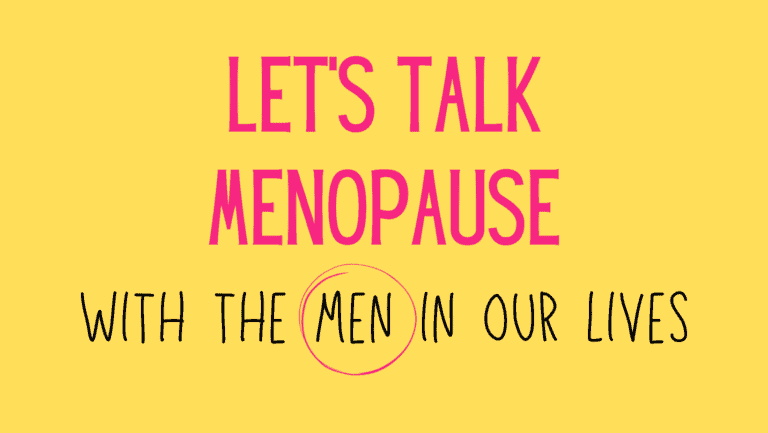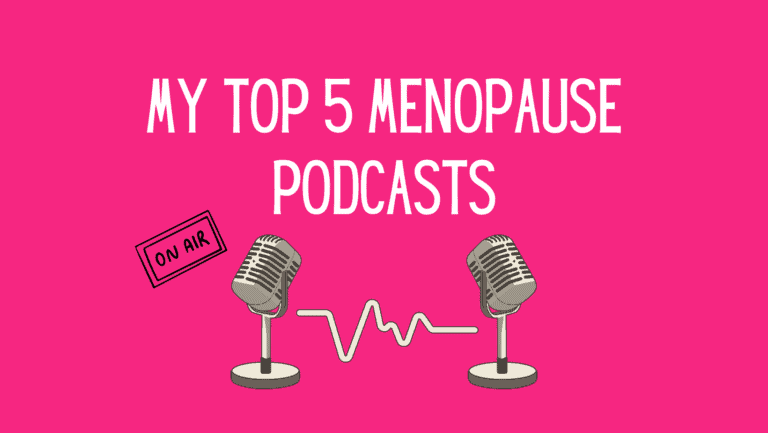Why write a blog post called “Let’s Talk Menopause”?
Well, I have a husband, two brothers, two sons and a Dad in his 70s, and being menopausal is NOT something they understand or really even want to understand.
So let’s talk menopause guide comes from what I have had to do to talk about menopause with my family.
Menopause transition and perimenopause can be intimidating and awkward to talk about even among female family members, let alone your husband or sons.
It’s estimated that 1 in 4 women have yet to broach the subject with their partner, and while gender is no longer a barrier when it comes to discussing absolutely anything, including menopause, not all of us feel comfortable enough talking openly about women’s health issues.
But what if you could find an easy process to create an open dialogue around menopause?
How would it feel to be able to confidently talk with your husband, dad, brothers, or sons without fear of judgment?
And let’s be honest when we talk menopause, we can often judge ourselves way too much.
In this ultimate guide on how to discuss menopause with your male family members, I will give you practical advice filled with honest insight into my own personal experiences, so you can finally have the menopause talk without feeling like you are an alien.
Why Is Talking To Our Men About Menopause So Important?

Menopause can be a tough transition for many women, it really has been for me, but it’s important to remember that it doesn’t just affect women.
Men and boys, whether they realise it or not, are also impacted by menopause. I know for years when my mood swings were all over the place, and I was forgetting really important things, my husband and sons really felt that and had no idea what was happening to Mum.
It’s important to have an open and honest conversation about it with your male family members.
It may seem uncomfortable to talk openly at first, but once you break the ice, you’ll find that it can be a really useful way to get the support you need during this time.
So go ahead and chat with your dad, your brothers, and your husband about what’s going on. Trust me, they’ll appreciate it. And who knows – maybe they’ll even learn a thing or two!
Why breaking the silence is crucial for understanding and support

It’s a truth universally acknowledged that ageing is inevitable, but men are seen as ageing like a fine wine and women are seen as barren.
This is why talking about menopause is so important. We are not over-the-hill, unsexy, dried-up mules and I refuse to let my sons think this is what menopause transition means!
Women everywhere will go through menopause at some point in their lives, but for some reason, it’s still somewhat of a taboo topic.
I mean, why is it that we can talk about everything under the sun, from politics to how often our kids poo, but somehow the topic of menopause is still rarely discussed?
Breaking this silence is crucial for understanding and providing support for us women going through this natural transition.
It’s time we shed some light on the subject of menopause and menopause health and embrace a new conversation that is authentic, empathetic, and real.
Understanding Menopause

If you are going to talk menopause with your men folk, you really need to understand it.
Providing evidence-based information to our men is a lot easier than trying to explain emotions.
I have broken down this really complicated stage as simply as I can!
So very simply, menopause is a time in a woman’s life when her reproductive hormones (estrogen and progesterone) start to fluctuate and deplete.
Perimenopause is when these hormones first start to fluctuate wildly and this stage can start years before menopause transition happens. Perimenopausal women will start to notice menopausal symptoms.
I have written a full blog post on perimenopausal symptoms but to highlight a few; hot flushes, joint pain, sore breasts, fatigue, brain fog, anxiety, mood swings, hair loss, weight gain and migraines.
Fun right?
A woman is classed as in menopause when she has not had a period for 12 months.
During menopause, the hormone levels start to flatten out and the symptoms become less intense. But, they can hang around for up to 10 years or so.
So menopause is a BIG deal for women and the men in their lives.
Common misconceptions and stereotypes surrounding menopause

The majority of misconceptions and stereotypes around the talk of menopause come from school.
I, at the time of writing this, am 44 and have been perimenopausal since I was 38.
Even as a fully grown-ass woman, I thought the menopause was when your periods end and you have some hot flushes.
The end.
THIS, my lovely ladies, is what the men in our lives think to.
Women of my age were not taught about menopause and looking at what my teenage sons are learning at school, it’s not much better today!
Misconception Number 1 – Menopause is when your periods stop and you get hot flashes.
Nope, it starts way before then, along with the symptoms, of which there are too many to remember (see below)
Misconception Number 2 – You are old now.
Women are living longer and longer and stronger than ever. We understand now how a lack of estrogen can affect our bones, so we are exercising more to stay strong.
Misconception Number 3 – You are no longer sexy and desirable.
You are so much more sexy now than ever before. You are wise and know who you are now. Self-confidence is as sexy as it gets.
Let's Talk Menopause with Male Family Members

Why?
Because they love you and they need to understand that you are going through something major.
Menopause is often considered a “women’s issue”, but in reality, it’s an issue that impacts entire families.
I mentioned before that my sons had no idea what was going on with me. I was tired all the time, had terrible mood swings, my migraines knocked me out and my family life was in the loo.
They needed to know that when the symptoms were bad, I needed support, kindness, help around the house and, most importantly, that me being grumpy with them was not about them!
During my worst anxiety symptoms, I completely withdrew from my family. They all thought I was upset with them and wanted to discuss that. I couldn’t face it, so I withdrew some more.
When I got the support I needed and explained what was happening, they could help me through this, rather than fight against the new me.
That’s why it’s essential to discuss it with male family members.
Preparing for the Conversation

Assessing your own comfort level and addressing any concerns
Look at how you are feeling, and make sure that you are in a calm, relaxed state to have this conversation.
The last thing you want is to be in a menopausal mood swing when you try to talk menopause.
Write a list of things you think that your partner will need to know or understand.
These can be anything from listing out the symptoms to helping him realise this is a completely normal stage in your life.
Pre-empt his questions, what might he ask you? Have an idea in your head so you can try and get all points covered in this one chat.
Tips for Talking Menopause to Your Husband/Partner

There will be lots of opinions out there on what is best here, but you know your husband better than anyone so tailor these to suit you.
Be open and honest: It’s important to be open and honest with your husband about what you are going through. Let him know how you are feeling both physically and emotionally. Share your experiences in as much detail as you can, to help him understand.
Educate Yourself: Many men folk may not fully understand what menopause is or the symptoms that come with it. I absolutely know that mine did not have a clue. Take the time to educate your husband about menopause, its effects, and how it may impact you.
Invite him to appointments: If you have a doctor’s appointment or are seeing a specialist for menopause, invite your husband to come with you. This will give him a better understanding of what is happening and allow him to ask any questions he may have.
Listen to his concerns and answer questions: Just as you have your own concerns and worries about menopause, your husband may also have questions or fears. Take the time to listen and address any concerns he may have.
Show appreciation: Menopause can be challenging for both partners, so it’s important to show appreciation for one another. Let your husband know you appreciate his support and understanding during this transition.
Overall, communication, education, and understanding are key to having a successful conversation about menopause with your husband. Remember to be patient (which is incredibly hard when you are menopausal!) listen to each other’s concerns, and offer support and love throughout this journey.
Navigating Conversations with Dad and Brothers

Approaching the menopause conversation is arguably the most scary.
I know it can be brutal to admit you are getting older. Will your dad question his mortality now he has a menopausal daughter, will your brother be grossed out?! It can freak you out if you overthink this.
Here are some tips to make the discussion more comfortable:
Choose the Right Setting:
Pick a quiet and private setting where everyone feels comfortable and won’t be interrupted. A bar with the football on in the background will not be a winner.Educate Yourself:
Same as with the husbands, make sure you are well-informed about menopause. This knowledge will allow you to answer questions and address any misconceptions they may have.Express Your Feelings:
Share your own experiences and honest feelings about menopause. Joking around is easy with family when the topic makes them uncomfortable. But now is a time to help them understand your feelings, so keep the one-liners for another time.Emphasize the Importance of Support:
Stress the significance of having a support system during menopause. Let them know that their understanding and support can make a positive difference in your well-being.Encourage Questions:
Make it clear that you are open to answering any questions they may have. This encourages a two-way conversation and helps dispel any uncertainties or myths they might hold.Be Patient and Understanding:
Understand that they may have limited knowledge or preconceived notions about menopause. Be patient, and approach the conversation with empathy, allowing them to express their thoughts and feelings.Share Resources:
Provide them with reliable resources or recommend materials that explain menopause in a straightforward manner. This allows them to educate themselves further and reinforces the information you’ve shared.
Remember, every family dynamic is unique, so adapt these tips to suit your specific situation.
Note the generational differences, especially with Dads and brothers, they will have a very old idea of what menopause is all about.
Including Sons in the Conversation

Educating the next generation of children about it is incredibly important.
As I mentioned, I have two sons and it was very important to me that they understood what I was going through.
I needed my sons to know that these changes were natural and normal and that the symptoms I was experiencing will pass.
No kid likes to see their Mum in distress, keeping the facts from them, will help them to make up their own mind, which is often so much worse than the truth.
Age-appropriate ways to discuss menopause with sons
For young children (ages 5-10): Start by explaining that menopause is a natural process that happens to many women when they get older, similar to how boys go through puberty. Keep the conversation light and simple, using words and concepts they can understand. I spoke to my 10-year-old openly about menopause and he now sees it as a totally normal thing. He knows about my hormones, he knows what they do to help me and he sees no stigma around it.
For pre-teens (ages 11-13): As children start becoming more aware of their own bodies and hormonal changes, discuss menopause in more depth. Explain the physical and emotional symptoms that may occur and assure them that it’s a normal part of life. My now 14-year-old and I have spent the last year comparing our hormonal mood swings. He has a much better idea about his own hormonal changes because we talk about mine. It’s a topic of conversation I never knew I would have my my 14 year son but it actually has brought us closer.
For teenagers (ages 14-18): At this stage, sons may have many questions about menopause and its effects on their mothers. Be open to answering their questions and addressing any concerns they may have. You can also use this opportunity to educate them about how they can support their mothers during this time.
Use real-life examples: Share stories of women who have gone through menopause and how it affected them other than yourself. This will help sons understand that menopause is a personal experience and not something to be ashamed of or embarrassed about.
Discuss the bigger picture: Use this opportunity to discuss the aging process and how it’s a normal part of life for everyone. Emphasize the importance of respecting and supporting women as they go through different stages in their lives, including menopause.
Overall, the key is to approach the topic with honesty and sensitivity, while also emphasizing that menopause is nothing to be afraid or ashamed of. This will help sons develop a healthy and positive attitude towards menopause and women’s health in general.
Strategies for handling difficult reactions

Listen actively: When facing resistance or discomfort from male family members, it’s important to listen carefully to their concerns and try to understand where they are coming from. This will help us address their specific fears or doubts in a respectful manner.
Educate with facts: Sometimes, people resist change because of a lack of knowledge or misinformation. By providing factual information, evidence-based information and statistics, we can help dispel any misconceptions and promote a more informed understanding of gender equality.
Personalize the conversation: Sharing personal experiences or stories can make the conversation more relatable and humanize the issue for our male family members. It can also help them see things from a different perspective.
Avoid getting defensive: It’s natural to feel defensive when faced with criticism or resistance, but it’s important to remain calm and avoid getting into a confrontational argument. Instead, try to have an open and honest dialogue. This is a tricky one when your hormones are lying around all over the place, but you need to really try.
Acknowledge their feelings: Change is hard and can bring up a range of emotions for both parties involved. It’s important to acknowledge the discomfort or unease our male family members may be feeling and assure them that our goal is not to attack or blame them.
Offer resources for further learning: If a male family member is interested in learning more about gender equality, it can be helpful to provide them with resources such as books, articles, or documentaries. This can help them continue their education on the topic at their own pace.
Set boundaries: While it’s important to have open and honest conversations, it’s also important to set boundaries if a male family member becomes disrespectful or dismissive. Let them know that their behaviour is not acceptable and that the conversation will need to end if they cannot communicate respectfully.
Conclusion:

In conclusion, openly discussing gender equality and related issues such as menopause with male family members is crucial in promoting a more equal and understanding society.
The well-being of our menopausal and perimenopausal women depends on how we look after ourselves and are received by those closest to us.
This includes the workplace, but educating colleagues, line managers and employers is a whole other ball game.
The working environment plays a massive role in the mental health of menopausal women. They are getting better at providing women with the support they need but there is a long way to go.
I talk about menopause and the workplace here.
By setting an example for future generations, we can break down barriers and foster stronger family bonds through open communication, empathy and understanding.
It is important to prioritize these conversations within our families and communities, as they contribute towards creating a brighter and more equal future for all.
I want my sons to grow up knowing that the women in their life will go through this stage and they will have the accurate information to look after their women.
So let’s continue to have these discussions, challenge harmful beliefs and stereotypes, and work towards a world where everyone is treated with respect and equality, regardless of their gender or stage in life.
Going through menopause can be scary, but we do not have to do it alone, our men are there for us.
Resources to Help:
If you need to show your partners where to look for expert advice and information, here are a few great places:
Menopause Balance for Partners
Kathryn x
Disclaimer: I am not a medical professional, herbal or physical therapist, and I am not educated in the menopause space. All opinions expressed on this blog are my own and should not be taken as medical advice. This blog is intended to share my personal experiences and insights, and should not be used as a substitute for professional advice. Please consult a qualified medical professional, herbal or physical therapist for any health-related concerns. Additionally, I strive to keep things light and entertaining, but please keep in mind that the topics discussed on this blog may be sensitive or triggering for some readers.
Get Your Free Perimenopause Symptom Checker
Thank you!
Your symptom checker is on its way to you!
